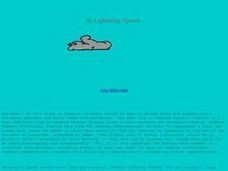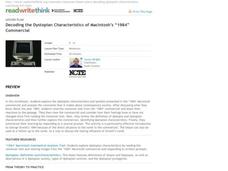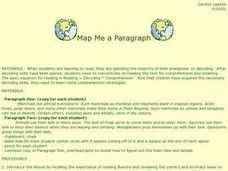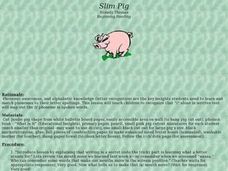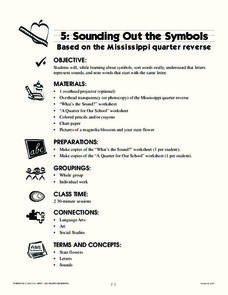PBS
Decoding Media Bias
Alternative facts? After watching the We The Voters film, "MediOcracy," viewers compare how cable news outlets CNN, Fox News, and MSNBC report the same story about politics or public policy. After a whole-class discussion of their...
Curated OER
Speed Racers
A review of decoding words is incorporated in a discussion on reading with expression in order to increase fluency. The teacher gives several book options for readers to practice smooth and inflected reading, giving a short book talk on...
Ohio Department of Education
Word Origins
Understanding a word's etymology can really help with decoding and building vocabulary skills. Readers compare and contrast words of similar origins but with different difficulty levels. They focus on prefixes, suffixes, and affixes....
Curated OER
Syllables
Review important reading skills with this resource on syllables. Learners discuss the rules for dividing words into syllables, and they practice this skill with a variety of words. This is a comprehensive and useful presentation to use...
Curated OER
At Lightning Speed
Review how to decode words and practice repeated readings for fluency. Kids review the cover-up method as a way to decode unknown words and then practice reading sentences for fluency and short passages with partners. They record their...
University of Pennsylvania
Decoding Propaganda: J’Accuse…! vs. J’Accuse…!
Reading snail mail is a great way to go back into history and to understand others' points of view. The resource, the second in a five-part unit, covers the Dreyfus Affair. Scholars, working in two different groups, read one letter and...
ReadWriteThink
Decoding the Dystopian Characteristics of Macintosh’s “1984” Commercial
Known as one of the most iconic advertisements of the 20th century, Macintosh's "1984" commercial has become more of a social statement. Present the ad to a new audience of viewers with a lesson focused on identifying dystopian...
Core Knowledge Foundation
Kindergarten Skills Unit 4
Fifteen lessons make up a unit that focuses on letter-sound correspondence. Beginning readers examine letters and their sounds. Scholars complete a review, an engaging activity, watch teacher modeling, and practice concepts. Lessons are...
Core Knowledge Foundation
Kindergarten Skills Unit 9
This unit explores uppercase letters and tricky high-frequency words. Over 23 lessons, scholars review decodable and high-frequency words, examine and practice writing uppercase letters, and work with a new tricky high-frequency word....
Core Knowledge Foundation
First Grade Skills Unit 2
Nineteen lessons make-up a four-week-long unit that explores long vowel sounds, nouns, and 11 high-frequency words. Lessons scaffold information to gain confidence in reading a decodable text and answering questions. Routines include...
Curated OER
Building Reading Skills: Fluency
Students practice their fluency skills. In this fluency lesson plan, students read aloud stories to their peers and they help to coach one another on their fluency, pronunciation, phrasing, and inflection. They discuss what makes a good...
Curated OER
Map Me a Paragraph
There are so many great reading strategies. In this lesson, learners practice decoding. They break down two paragraphs to analyze and determine main ideas and details. They each observes ways to model as they map their paragraphs.
Curated OER
Decoding Strategies
Young scholars practice using context clues to decode the meanings of unfamiliar words. In this vocabulary skills lesson, students follow the provided instructions to complete graphic organizers that enable them to decode words in Lewis...
Texas Center for Learning Disabilities
Second and Third Grade Explicit Phonics Intervention
Support all young learners on their journey to literacy with this five-lesson reading intervention unit. Following a clearly outlined format, each lesson first engages children in practicing their phonemic awareness and phonics skills...
Curated OER
You can call me.........Speedy Gonzalez!
Students practice their decoding skills to increase reading fluency. They use timed reading to observe the rate at which they read. They work in small groups to read a book in a time situation.
Curated OER
Slim Pig
Beginning readers study the short /i/ sound. First they determine how the mouth moves when they say the target words in a tongue twister. They complete letterbox activities by making words with the short /i/ before reading What Is It and...
Curated OER
School-Home Links: Compound Words #2
Provide elementary learners additional practice with compound words. First they identify the two independent words used to create a compound word, and then they search for examples in their daily life. Where can you read or hear compound...
Curated OER
Prefixes
Learners explore prefixes, and how they help us decipher unknown words. Decode and define the meaning of boldface words with prefixes used in context on a classroom chart. Writers complete a worksheet practicing the same skill.
Curated OER
Sounding Out the Symbols
Using the states as a hook, kindergartners identify beginning sounds. They identify the initial sound in words like Mississippi and Indiana and complete a set of worksheets related to this skill.
Curated OER
Split Suffixes
Make new words by adding suffixes to word beginnings. There are four suffixes here: -ible, -able, -ive, and -ion. After using them to complete five given words, they use their vocabulary skills to apply the suffixes to words they think...
Curated OER
Decoding the First Alphabets: Not as Simple as A, B, C
Explore early writing systems and their significance in understanding the development of past civilizations. In groups, learners research early writing systems and then present their findings to the rest of the class. They teach their...
Florida Center for Reading Research
Word Steps
Blending basic CVC letters to make words is one of the first steps to independent reading. Provided here are several images of stairs and several letters to cut and arrange. The learner rearranges the letters to form CVC patterns, sounds...
Curated OER
Diving into Iceland's Genetic Pool
Investigate ethical issues surrounding the Decode project in Iceland. Middle and high schoolers take the positions of the Icelandic government, scientific researchers, and citizens and defend or refute the Decode project in a Reykjavik...
Student Achievement Partners
"The Glorious Whitewasher" from The Adventures of Tom Sawyer by Mark Twain with Mini-Assessment
It's the classic scene: Tom Sawyer is whitewashing a fence. Expose your learners to Mark Twain's humor while reinforcing reading comprehension. Eighth graders are encouraged to read and reread, achieving as much exposure to the text as...
Other popular searches
- Decoding Skills Second Grade
- Phonetic Decoding Skills
- Teaching Decoding Skills
- Decoding Skills and Fluency
- Teach Decoding Skills
- Decoding Skills Worksheets
- Long Word Decoding Skills
- Encoding and Decoding Skills
- Literacy With Decoding Words






